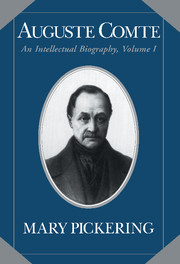Book contents
- Frontmatter
- Contents
- Acknowledgments
- Abbreviations
- Introduction
- 1 The Early Years
- 2 The Life and Works of Saint-Simon up to 1817
- 3 Comte's First Works for Saint-Simon
- 4 Comte's Growing Independence, 1819–1821
- 5 The Fundamental Opuscule and Comte's Rupture with Saint-Simon
- 6 The Aftermath of the Rupture: The Search for Connections
- 7 Comte's Efforts to Establish Himself
- 8 Intellectual and Mental Crises
- 9 The Road to Recovery, 1828–1830
- 10 Years of Success and Confrontation, 1830–1838
- 11 Comte's Changing Psyche and Aberrant Behavior, 1838–1840
- 12 The Encounter between Two Luminaries: Comte and Mill
- 13 1842: A Turning Point
- 14 Cours de philosophie positive: Positivism and the Natural Sciences
- 15 Cours de philosophie positive: Sociology
- Conclusion
- Bibliography
- Index
5 - The Fundamental Opuscule and Comte's Rupture with Saint-Simon
Published online by Cambridge University Press: 06 January 2010
- Frontmatter
- Contents
- Acknowledgments
- Abbreviations
- Introduction
- 1 The Early Years
- 2 The Life and Works of Saint-Simon up to 1817
- 3 Comte's First Works for Saint-Simon
- 4 Comte's Growing Independence, 1819–1821
- 5 The Fundamental Opuscule and Comte's Rupture with Saint-Simon
- 6 The Aftermath of the Rupture: The Search for Connections
- 7 Comte's Efforts to Establish Himself
- 8 Intellectual and Mental Crises
- 9 The Road to Recovery, 1828–1830
- 10 Years of Success and Confrontation, 1830–1838
- 11 Comte's Changing Psyche and Aberrant Behavior, 1838–1840
- 12 The Encounter between Two Luminaries: Comte and Mill
- 13 1842: A Turning Point
- 14 Cours de philosophie positive: Positivism and the Natural Sciences
- 15 Cours de philosophie positive: Sociology
- Conclusion
- Bibliography
- Index
Summary
The fact is that I foresaw the result for a rather long time, and I should have foreseen it earlier. M. de Saint-Simon had, like fathers vis-à-vis their children and like mother countries with regard to their colonies, the small inconvenience, which physiology shows to be almost inevitable, of believing that having been his student, I must continue to be so indefinitely, even after my beard grew.
Comte, 1824THE COMPOSITION OF THE OPUSCULE
Throughout Du système industriel, Saint-Simon had been appealing to the scientists, the “positive intellectuals” who should lead France to the industrial regime. Suddenly, in the article “VIe Lettre: Résumé des lettres sur les Bourbons,” Saint-Simon called for “positive philosophers” — “men busy with observing and coordinating positive generalities” — to develop a “general idea” to help the scientists form an “industrial doctrine.” He was willing to accept this “great mission,” but would be happier if it were taken up by a “more capable positive philosopher.” Saint-Simon obviously had Comte in mind. The essay that eventually emerged from Comte's pen was the Prospectus des travaux scientifiques nécessaires pour réorganiser la société. Because, as he himself said, it marked his philosophical debut and “irrevocably” determined the direction of his life, it has always been called the “fundamental opuscule.”
- Type
- Chapter
- Information
- Auguste ComteAn Intellectual Biography, pp. 192 - 244Publisher: Cambridge University PressPrint publication year: 1993

